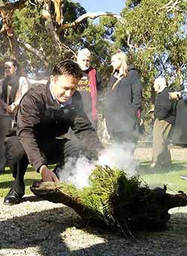
WE’RE smoked. Well and truly. Our clothes reek of that lovely campfire smell of burning eucalyptus leaves.
We also have a new deeper sense that we belong here. The smoke, we have been told, is a virtual passport through Bunurong country, at least for as long as our smokiness lingers.
Under a canopy of manna gum trees, on a crisp autumn morning, with a soundtrack of honeyeaters and wattle birds, Adam explained the different types of smoking ceremony: one for within the tribe and the other about the relationship with the land and outsiders.
“Today’s ceremony is for those who live in Bunurong country, for those who care for Bunurong country, and those who love Bunurong country.”
First on the fire were some sprigs of wattle, followed by manna gum and cherry ballarto. The order, as well as the varieties, was important. Then we were invited to douse ourselves in the thick smoke wafting from the Bunurong fire. That distinctive smell was a signal to other Bunurong people that we had been invited onto country.
“Get it right through your clothes, get it into your pores,” Adam said. “Those three together represent the Bunurong smell.
“If you went to another district you’d need to get their smell. If you were going to our eastern neighbour, the Gunai-Kurnai, you’d need the smoking ceremony to get into their country.”
The smoking and flag-raising ceremony, involving staff from Phillip Island Nature Parks, Bass Coast Council and Westernport Water, was one of several local events marking National Reconciliation Week.
The three groups have each drawn up reconciliation action plans or are in the process of doing so.
Bass Coast Mayor Pamela Rothfield said her council was on a journey as it started work on formulating an action plan to acknowledge the first Australians and to be more inclusive. “Every time I hear Adam speak I learn something new.”
Westernport Water’s action plan has just been accredited but managing director Peter Quigley said the organisation was at the beginning of our journey. “Gippsland’s indigenous history has long been buried. As a middle-aged white male, my experience of indigenous culture is limited.”
Phillip Island Nature Parks is now moving into its third action plan. Acting CEO Kevin Love said it was encouraging to see Bass Coast’s three biggest public sector organisations come together with the local community to acknowledge the past and work for a richer future.
After the ceremony, Tamara Chumbley, a member of the local Aboriginal community, echoed his thoughts. “Today was a good turnout. It’s good to see the Bass Coast community get involved.”
A visitor, Wendy Bojkowski, said she decided to come to the event because she was previously involved with the Gunai-Kurnai Aboriginal community in East Gippsland and missed that involvement when she moved to Phillip Island. She was heartened by the growing relationship between Aboriginal and white Australians on the island.
Anne Davie, co-chair of the Bass Coast/South Gippsland Reconciliation Group, said it was heartening to see more people attending reconciliation events each year. “People are starting to realise what an amazing culture we’ve inherited and ignored for so long.”
Laura Brearley, an organiser of the Phillip Island Whale festival, said a critical mass had been reached in acknowledging past wrongs and embracing the richness of Aboriginal culture.
“It’s exemplified by the formal partnerships but also among the people in the group
and the long-time friendships. I think something has shifted significantly in the collective thinking. People are waking up to the wisdom of indigenous people and how they’ve managed to live here sustainably for 2400 generations and we’ve messed it up in seven generations.”
Dr Brearley said there was also something about Phillip Island. “Perhaps it’s the healing power of nature. Here we’ve got to acknowledge that we belong to the earth. The indigenous wisdom we’ve been gifted is that the Earth is always headed back towards balance.”